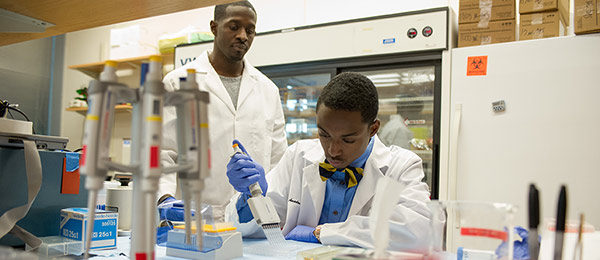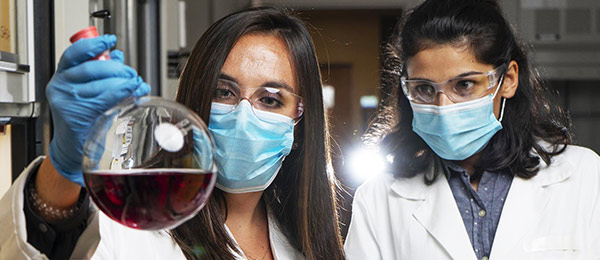
The challenge and opportunity for the College of Sciences in the decade ahead is to capture the power of our community so that we can make fundamental discoveries, address humanity’s most pressing challenges in the 21st century, and develop global leaders in science and technology. To support our work, we are committed to workplace, education, and research excellence — and to a community representative of our greater world. We are inspired to realize the Georgia Tech motto of “Progress and Service.”


Our Themes
The main goals of our plan — excellence in the workplace, in education and training, and in our research endeavors — are designed to bring distinction to the College and to Georgia Tech. Cutting across all goals are three themes that will infuse our efforts in the decade ahead.
Catalyze Discovery and Solutions
We plan to push the frontier of fundamental knowledge in science and mathematics, to advance solution- based science, and to support the arc that connects these avenues of discovery. While continuing to catalyze fundamental science across the College, we will amplify our impact by focusing more intently on convergent science that seeks to improve the health of the planet and people in the state of Georgia, across our nation, and our world. Furthermore, we will imbue our learning environment for undergraduate and graduate students with a culture that emphasizes and values discovery, solutions, and their connection.
Amplify Impact
We aim to amplify our research impact by supporting and rewarding efforts to lead team science and entrepreneurship — and by developing faculty as scientific leaders at Georgia Tech and beyond. We plan to increase the representation of the College’s majors to 20% of the Georgia Tech undergraduate population, thereby establishing a critical mass and raising the internal and external impact of science and mathematics at Georgia Tech. We aim to develop and model a successful workplace with policies, procedures, and practices that can be shared across the Institute. Finally, we plan to amplify our impact through strategic philanthropic and communication efforts.
Build Communities of Excellence
To build the community that can most effectively advance the vision and mission of the College, it is imperative that we create an environment for all students, staff, and faculty members and that we recruit, welcome, and retain a population for all sectors of our community. Community is built not simply from a collection of individuals, but rather from the relationships they forge. To that end, we will work to create a community infused with excellence, respect, professionalism, and trust — where all members have opportunities for professional development and support.
Download the Strategic Plan
Download the Strategic Plan Implementation Guide
Next Steps: Proposals and Projects
In January 2021, College of Sciences Dean and Betsy Middleton and John Clark Sutherland Chair Susan Lozier invited all College of Sciences students, staff, and faculty to submit proposals for activities, projects, and initiatives that will contribute to meeting the goals of the strategic plan.
Collective funding to achieve the proposals is provided through a generous $300,000 investment by the Betsy Middleton and John Clark Sutherland Dean's Chair. In March 2021, a dozen proposals were selected for project funding. These projects are led by collaborative and interdisciplinary teams of students, staff, and faculty.


